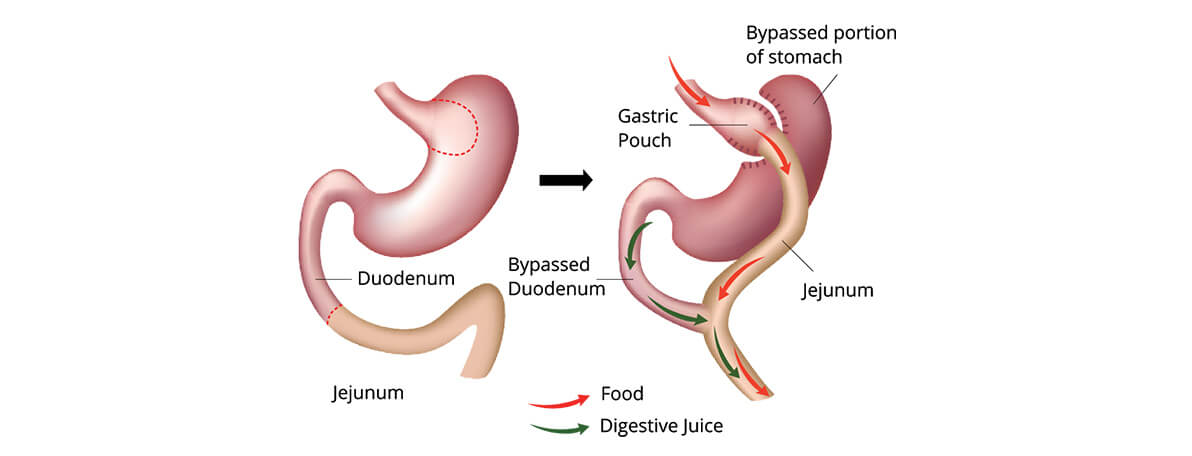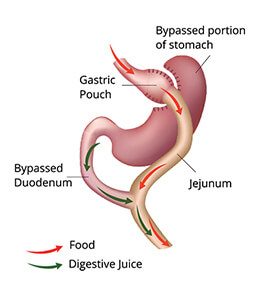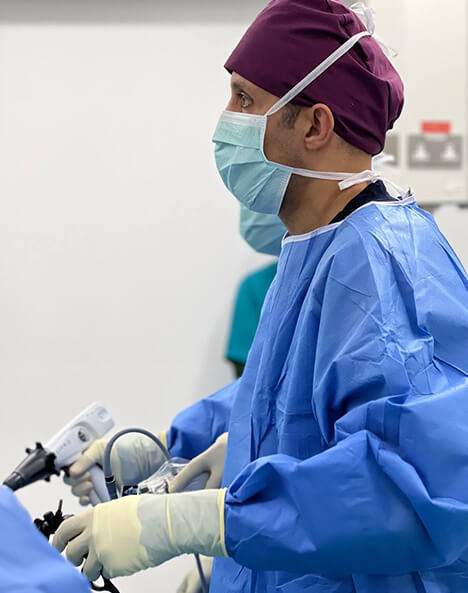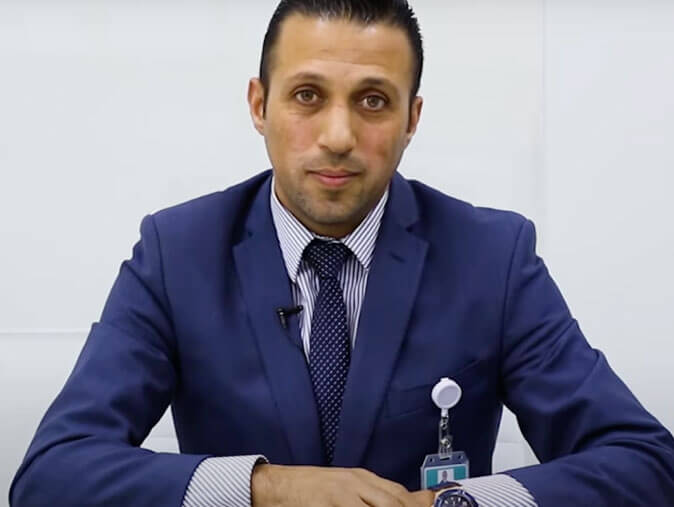What Is a Roux-en-Y Gastric Bypass?
The Roux-en-Y gastric bypass is a weight loss surgery that helps individuals lose weight when other methods, such as diet changes and exercise, haven't given the desired results. It is one of the most effective and sustainable weight loss procedure suggested by weight loss experts and doctors around the world.
Defining Roux-en-Y Gastric Bypass Surgery
In simple terms, Roux-en-Y gastric bypass is a process that alters your digestive system to help you eat less and absorb fewer calories. This surgery creates a smaller stomach, called a pouch.
The surgeons then attach this pouch directly to your small intestine, skipping a large part of your stomach and the first part of your small intestine. Because of this, you tend to feel full quicker and absorb fewer calories, which aids in weight loss.


How Does Roux-en-Y Gastric Bypass Surgery Work?
RYGB Promotes weight loss in 2 ways:
The surgery uses two methods to help you lose weight - restriction and malabsorption. Restriction is where the surgery physically makes your stomach smaller, limiting how much food it can hold. This helps you feel full faster. Malabsorption is where the surgery allows the food to bypass part of your small intestine, reducing the number of calories your body can take in. Together, these two actions lead to weight loss.
Benefits of Roux-en-Y Gastric Bypass Surgery
There are several advantages of this type of surgery:
It's a keyhole surgery: Also known as laparoscopic surgery, it's less invasive with fewer cuts on your body, so it heals quicker and leaves smaller scars.
Long-lasting weight loss: Because your stomach size is reduced and the food bypasses part of your small intestine, you tend to lose weight and keep it off.
Health problems get better: Weight-related health issues like type 2 diabetes, high blood pressure, and sleep apnea often improve.
No foreign objects: Unlike other surgeries, this procedure doesn't leave any foreign objects like a gastric band inside your body.
Qualifications for Roux-en-Y Gastric Bypass Surgery
Although this surgery can be life-changing for people who are very overweight, it's important to meet certain criteria:
Body mass index (BMI): To be a suitable candidate, your BMI should generally be 40 or more, or 35 or above with serious health problems linked to obesity.
Previous attempts to lose weight: You must have tried to lose weight through diet, exercise, and other traditional methods before considering this surgery.
Mental readiness: Before the surgery, you'll have a check-up with dietitians, psychologists, and specialists to make sure you're mentally and physically ready for the operation and the changes you'll need to make in your life afterward.
The Roux-en-Y gastric bypass surgery can greatly improve the lives of those who are struggling with obesity. It's important to fully understand the process, benefits, and commitments required for this type of surgery.
If you think you might be a good candidate, consult with a team of medical professionals. They can help guide you on your weight loss journey. It's a big decision, but with the right support and information, it's one that could change your life for the better.
Understanding Roux-en-Y Gastric Bypass
Limiting Food Intake
Roux-en-Y Gastric Bypass is a weight loss procedure that modifies your stomach and small intestine. This surgery restricts the amount of food your body can handle. With a smaller stomach, you'll eat less and still feel satisfied. Plus, your body won't absorb all the calories from the food you eat. This dual action contributes to gradual weight loss.
Managing Weight-Related Health Conditions
Excessive weight can lead to serious health problems like heart disease, type 2 diabetes, sleep apnea, and joint discomfort. The weight loss induced by Roux-en-Y Gastric Bypass can help alleviate these conditions. The resulting health improvement can lead to reduced medication dependency, motivating a healthier and more dynamic lifestyle.
Enhancing Quality of Life
The benefits of Roux-en-Y Gastric Bypass extend beyond shedding pounds. It's about enhancing your overall life quality. Improved mobility, energy, and health are just a few of the rewards. Plus, it often boosts self-esteem, confidence, and mental health. This shift touches every aspect of your life.
Enhanced Safety
Compared to other weight-loss surgeries, Roux-en-Y Gastric Bypass is a safe option. It involves creating a small stomach pouch and bypassing a portion of the small intestine, minimizing complications. The procedure is performed laparoscopically, making it less invasive, faster, and safer.
Improving Physical Function
Excess weight can compromise your physical function and life quality. Roux-en-Y Gastric Bypass can help. Weight loss can ease everyday tasks. The improvement in flexibility, balance, and physical function can bring more joy to your life, enabling you to engage in activities that your weight previously limited.
Boosting Mental Health
Furthermore, Roux-en-Y Gastric Bypass provides notable psychological benefits. Overweight can trigger feelings of depression, anxiety, and low self-esteem. Roux-en-Y Gastric Bypass can alleviate these emotional challenges by enabling significant weight loss. The resulting increase in mental health, relationships, and life satisfaction can foster social ease and well-being.
Operational Outline
Roux-en-Y Gastric Bypass surgery usually takes about 2-3 hours under general anesthesia. Through small incisions in the abdomen, the surgeon creates a small stomach pouch and reroutes the small intestine.
After modifying the digestive tract, the incisions are closed. Roux-en-Y Gastric Bypass, which limits food intake and reduces calorie absorption, is less invasive compared to other surgeries.
Getting Ready
Preparation for Roux-en-Y Gastric Bypass starts long before the actual operation. Once you've been deemed suitable for the procedure after a thorough medical evaluation, you'll be asked to follow a specific diet for a few weeks. Detailed instructions will be given.
The purpose of this diet is to decrease the fat content in and around your liver, which increases the procedure's safety. Also, to ensure an empty stomach during the surgery, fasting for at least 12 hours before the procedure is required.
Recovery Post Treatment
Typically, Roux-en-Y gastric bypass patients remain in the hospital for two to three days. This allows healthcare professionals to closely observe and manage any potential postoperative issues or discomfort.
During this period, healthcare staff will keep an eye on your vital signs, manage any discomfort, administer necessary medication, and monitor the healing of surgical incisions.
Dietary Recommendations and Nutrition Advice
Post-surgery dietary guidelines are tailored to facilitate healing and foster weight loss. A liquid diet is advised for the first 1 to 2 weeks post-surgery, slowly progressing to pureed foods, and finally to solid foods.
Comprehensive guidance will be provided about portion sizes, nutrient needs, and how to sustain a balanced diet. Given that meal sizes will be significantly smaller, chewing food carefully is paramount to ensure proper digestion and absorption.
Guidelines for Physical Activity
Recovery from Roux-en-Y gastric bypass surgery also includes a gradual reintegration of physical activities. It starts with mild actions, such as walking, gradually incorporating more demanding tasks as you continue to recover.
This may include low-impact aerobic activities and strength training exercises to aid in muscle development and metabolic enhancement.
Psychological Health Considerations
While the primary focus of Roux-en-Y gastric bypass surgery is to improve physical health, it's important to acknowledge the emotional implications as well. Ensuring patients have the emotional support necessary to navigate the changes and challenges after surgery is vital.
Should any emotional issues arise related to food, body image, or self-esteem, seeking professional help through counselling or therapy is strongly advised.
Potential Risks and Concerns
Like all medical procedures, the Roux-en-Y gastric bypass involves certain risks. Even though it is generally deemed safe, some issues may arise following surgery. These include:
Post Surgery Risks
Post-surgical bleeding and infection: While these are not commonplace, they remain a concern that requires close attention.
Formation of blood clots: These can develop in the legs and migrate to the lungs, a situation that necessitates urgent medical attention.
Abnormal heart rhythm: This might occur, but is usually manageable with appropriate medical treatment.
Pneumonia: This is a risk related to anesthesia and surgical procedures.
Specific Risks Tied to The Procedure
-
Stomach leakage: Fluid can leak from the stomach into the abdominal cavity, demanding immediate medical care.
-
Malnutrition: The altered digestion process can result in nutrient deficiencies.
-
Dumping syndrome: This can happen when food moves too quickly from the stomach into the small intestine.
-
Ulcers: These can form in the stomach, especially if you smoke or take aspirin or other types of anti-inflammatory drugs.
Long-Term Effects
This procedure is irreversible. Once completed, your stomach and digestion process cannot be returned to their original state. That's why it's crucial to discuss this operation in detail with your healthcare provider before deciding.
The Importance of Post-Procedure Care
After the surgery, the care you take of your body is extremely important. Regular follow-ups are necessary to:
Maintain Wellness and Monitor Progress
-
Track your progress: Keep an eye on your weight loss and improvements in overall health.
-
Address complications: Identify and deal with potential issues promptly.
-
Adjust treatment, if necessary: Change the plan to suit your changing requirements.
-
Provide support: Help you adjust to the changes post-surgery.
Dedication to Lifestyle Changes
A Roux-en-Y gastric bypass is not a miracle solution; it requires a lasting commitment to lifestyle changes. These include:
-
Adopting a healthy diet: Focus on nutrient-rich foods and portion control.
-
Regular exercise: Incorporate workouts into your daily routine.
-
Behavioral adjustments: Make smart food choices and modify eating habits.
These lifestyle changes are crucial for sustaining weight loss and overall health post-surgery. Reverting to old habits could lead to weight regain.
Shaping the Body
Excess skin after a rapid weight reduction is common. You may want to consider surgery if this is affecting your ease and confidence. Wait until your body has adjusted, which may take up to 18 months.
Supplements and Nutritional Needs
Roux-en-Y gastric bypass surgery can affect nutrient absorption. Deficiencies in vitamins such as B12, iron, calcium, and vitamin D can occur. Regular medical checks and maintaining a balanced diet can help avoid these issues.
Being aware of the benefits and risks of Roux-en-Y gastric bypass surgery can help you make an informed decision. Post-operative care, lifestyle changes, and balanced eating habits can enhance the benefits of the procedure and ensure long-term weight loss success.
Consult our healthcare team to discuss your individual situation and determine if Roux-en-Y gastric bypass is the right option for you.
Frequently Asked Questions
-
What is Roux-en-Y gastric bypass surgery?
This is a type of weight loss surgery that alters your stomach and small intestine. It helps you manage your weight by limiting how much you can eat and how many nutrients you can absorb.
-
Why is it called "Roux-en-Y"?
The name comes from the Y-shaped connection that surgeons make between the stomach and small intestine. The technique is named after a Swiss surgeon, Cesar Roux, who first described it.
-
Who qualifies for a Roux-en-Y gastric bypass?
Generally, people with a Body Mass Index (BMI) over 40, or a BMI over 35 with serious health problems linked to obesity, such as type 2 diabetes or heart disease, might be candidates. Doctors consider your overall health, readiness, and other factors before deciding.
-
What should I expect before the surgery?
You'll go through various tests and meet with a dietitian to discuss changes in your eating habits. You might need to start a physical activity program and quit smoking if you do smoke.
-
How is the Roux-en-Y procedure done?
During the operation, surgeons create a small pouch at the top of your stomach. They then connect this pouch directly to the middle part of your small intestine, bypassing the rest of your stomach and the upper part of your small intestine.
-
In what ways may this procedure improve your condition?
After the procedure, many patients report dramatic reductions in body mass. As an added bonus, it may help treat or even cure illnesses including type 2 diabetes, hypertension, and sleep apnea.
-
What potential problems could arise, if any?
There is a chance of bleeding, infection, and other consequences much as with any major operation. Long-term dangers include nutritional deficits and 'dumping syndrome,' which occurs when food is emptied from the stomach into the small intestine too rapidly.
-
When can you expect to feel back to normal after having surgery?
After surgery, you may need to recover in the hospital for up to a week. Recuperation time ranges from three to five weeks, depending on the severity of the patient's illness.
-
Should I make any changes to my diet before or after surgery?
Yes, you will need to eat a special diet that consists mostly of liquids, then pureed food, then soft food, and finally solid food. Reduce the size of your meals and consider taking nutritional supplements.
-
Does reversing the Roux-en-Y gastric bypass procedure work?
It is feasible to undo the operation, but doing so has significant risks and is thus often avoided. Your individual health status will play a major role in the choice.
BOOK Now
Make An Appointment
-

+971502343442
Contact Dr. Samir if you have any questions
-

Visit
02 Jumeirah Beach Rd - opposite Burj Al Arab - Umm Suqeim - Jumeirah 3 - Dubai
Opening Hours:
9am-9pm (Saturday- Thursday)
9am-6pm (Saturday)






